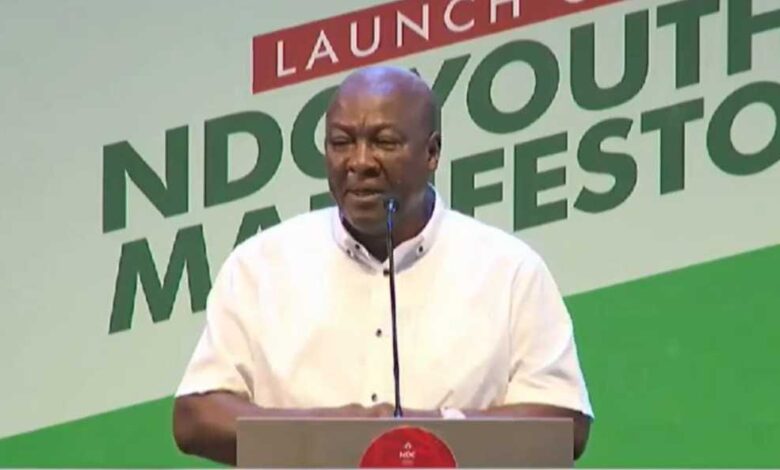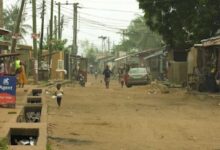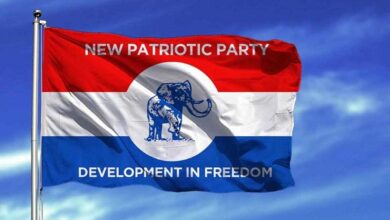Full Text: Speech by John Mahama at launch of NDC’s Youth Manifesto

Remarks by HE John Dramani Mahama at the launch of the 2024 NDC Youth Manifesto
UPSA Auditorium- August 12, 2024.
Happy Interntaional Youth Day to you all—my children, nieces and nephews, sisters and brothers, and my beloved, talented, and dynamic young Ghanaians.
Thank you for the honour. I am excited to have the opportunity to launch the Natonal
Democratic Congress (NDC) Youth Manifesto before you today, August 12th.
As you have heard from the various presentations, the NDC Youth Manifesto is the blueprint for our commitment to empowering the youth of Ghana and unlocking your potential for sustainable development.
This year’s international theme is “From Clicks to Progress: Youth Digital Pathways for
Sustainable Development”. The theme perfectly underscores the transformative power of digital technologies in driving progress and shaping the future.
As we celebrate young people’s contributions to leveraging digital tools for positive change, I am proud to reaffirm our pledge—the Mahama and Naana Jane administration’s pledge—to upscale digital skills and training for Ghanaian youth. We envision a future where every young Ghanaian has the opportunity to thrive in the digital age. We are committed to supporting digital start-ups and incubation hubs and training one million young Ghanaians in coding.
Additionally, we will invest the equivalent of $3 billion in collaboration with the private sector to build a vibrant technology and FINTECH industry that will create jobs and boost economic growth.
The 24-hour economy policy we will implement in 2025 is a game-changer that will open new job markets, foster entrepreneurship, and drive innovation. By creating an enabling environment for young people to thrive, we will lay the foundation for a prosperous future for all Ghanaians.
But our commitment to the youth goes beyond digital empowerment. The NDC Youth
Manifesto outlines several key initiatives, including increased access to quality education from the basic and second-cycle to tertiary levels, affordable healthcare, and job creation programmes.
Ladies and gentlemen, I want to acknowledge the commendable efforts of our National Youth Wing, led by George Opare Addo, for this morning’s youth event.
Since I launched Ghana’s first National Youth Policy in Cape Coast in 2010 during my tenure as Vice President, I have remained committed to recognising and honouring our youth on International Youth Day.
As President, I consistently hosted gatherings with young people and youth development stakeholders to celebrate the ingenuity and contributions of the youth. One of the most memorable of these was the day I spent with a young cocoa farmer and his family in Assin North.
Also, during my presidency, my government prioritised investments in youth development across various sectors, including education, skills training, health, recreation, sports, and job creation.
We expanded access to skills training opportunities throughout the country, as well
as to teacher and nursing training programmes and tertiary education. I also purposefully appointed intelligent and hardworking young men and women to serve in
my government. And they performed creditably well! Their excellent performance gives me the confidence to appoint more young people to serve in my government from January 2025 – God willing, when I am voted President.
The National Youth Authority Act, enacted in 2016, strengthened the framework for youth development. That piece of legislation streamlined the operations of the National Youth Authority, increased youth representation on its governing board from one to three members and recognised the establishment of the Ghana Youth Federation as a platform for all youth led organisations.
The law also mandated the creation of Regional and District Youth Committees to encourage youth involvement in decision-making. Notably, it allocated a portion of the District Assemblies Common Fund to enhance youth development, addressing the century-old complaint of resource constraints.
Challenges Facing Our Youth
Mismanagement of our economy, pervasive corruption, nepotism, and poor governance under the current administration have combined to negatively impact the youth. Many young people are eager and ready to work but struggle to find employment.
The rising unemployment rate, currently at a staggering 14.7%, was worsened by the banking sector cleanup, which led to widespread job losses, especially among banking and finance professionals.
Other statistics that show the dire situation of Ghanaian youth are the 21.7% youth
unemployment rate, the 8 million Ghanaians who went a day without food—many of them young people—and the 1.9 million youth who are not employed, educated or trained.
The harsh business climate has caused numerous businesses to collapse, resulting in further layoffs. The ongoing crisis is fostering frustration among the youth, increasing poverty, social unrest, and disenchantment with the political process.
The scarcity of job opportunities compels many young individuals to resort to low-paying informal work or seek opportunities abroad, exacerbating the brain drain that hampers our national development.
This reality perpetuates inequalities and undermines social stability, as the potential of our youth remains untapped.
To tackle these issues, I have proposed a sustainable vision to Reset Ghana by introducing and aggressively implementing the 24-Hour Economy Policy.
If you are hearing about the 24-hour economic initiative for the first time or pretending that you do not know what it is about, please cock your ears and listen to me explain it again.
A 24-hour economy will enable one job to be shared across three shifts and employ three persons, providing job opportunities for three workers instead of one. This policy, which aims to drive economic growth, improve service delivery, and create jobs in both the public and private sectors, will prioritise the needs of our youth.
For the policy to thrive, the government will invest in security and public safety measures, including recruiting additional personnel and enhancing street lighting to promote nighttime economic activity.
Essential components of the public sector’s 24-hour services will include:
– 24-Hour Ports & Harbours
– 24-Hour Customs
– 24-Hour DVLA Services
– 24-Hour Passport Services, among others
I also intend to incentivise the private sector to operate 24 hours. Targeted sectors will include:
– 24-Hour Agro-processing
– 24-Hour Manufacturing
– 24-Hour Construction
– 24-Hour Sanitation & Waste Management
– 24-Hour Financial Institutions
– 24-Hour Retail and Tourism Services
Aside from incentives provided for businesses that sign up for the policy, increased demand driven by deliberate government procurement of locally made goods and an expanded export drive under the ETLS and AfCFTA will absorb the increased supply of goods and services.
These enhancements will create decent, well-paying jobs and training opportunities for you, our vibrant youth.
Empowering our youth through digital skills
My young brothers and sisters, ICT is vital to the 24-hour economy. That is why we will equip young people with digital skills and job opportunities, including the One Million Coders programme.
The Accra Digital Centre was established to facilitate jobs for you, the youth. The Centre will train students and unemployed graduates, enabling them to capitalise on digital job opportunities.
We will work with the telcos to reduce the data cost and deploy free Wi-Fi in schools and selected public places.
Dear Ghanaian youth, the 8-hour work system is woefully inadequate to generate the
production, productivity, and well-paying jobs needed to revive Ghana’s bankrupt economy. It is also inadequate to produce enough jobs for you.
As I stated during my JohnMahamaLive virtual event some weeks ago, extraordinary times require extraordinary interventions for exceptional results. Ghana is experiencing extraordinary hardships, and the youth are also choking under the yoke of these hardships.
This being the case, the 24-hour economy initiative is the best and most extraordinary pathway to generating the decent and well-paying jobs you need—the jobs you have been waiting for!
We will create an enabling environment with deliberate policies for businesses, companies, and government institutions to operate 24/7 in a three-ship system to stimulate job creation.
I am determined to provide the necessary incentives, such as favourable tax measures and cheaper and more reliable power. We will also provide financial support through the Ghana EXIM Bank, our oil revenue, and the Women’s Development Bank, among others.
This is why the Trades Union Congress described the 24-Hour Economy initiative as a “Great idea that could be the game-changer for youth employment”. Also note that the Ghana Federation of Labour, the Chamber of Local Governance (ChaLoG), the National Union of Ghana Students (NUGS), the IEA and many other well-meaning Ghanaians have spoken favourably about the 24-hour economy initiative.
We shall not fail them. We shall deliver to exceed their expectations, and you will have the jobs you have been waiting for. No one will be left out!
I must say, at this point, that before I left office in January 2017, my government, through the National Development Planning Commission (NDPC), developed a 40-year Development Plan, which captured the 24-hour economy initiative.
Elections truly have consequences! This is why you must vote wisely for change on December 7 for John Mahama and your NDC Parliamentary Candidates.
Commitment to Youth Development
I am resolute in my commitment to establishing a dedicated Ministry for Youth Development.
This ministry will centralise the coordination of youth initiaKves in Ghana, facilitate job creation, promote entrepreneurship, provide scholarships and enhance youth participation in decision-making while ensuring the effective implementation of the National Youth Authority Act.
Addressing Skills Training Gaps
Despite various initiatives, a significant gap exists between the skills offered by educational institutions and the demands of the job market. Only about 10% of young people receive formal skills training, hampering their employability and economic prospects.
The current situation is detrimental to innovation and economic growth, particularly affecting artisans and craftsmen who need access to modern tools and training.
To address these shortcomings, the next NDC government will partner with religious bodies and non-governmental organisations to invest in diverse skills development programmes to enhance the economic opportunities available to our youth.
The National Apprenticeship Programme and expanded T-VET centres will provide skills
upscaling for youth who could not progress to the tertiary level.
Improving Recruitment Practices
Political bias and nepotism have tarnished recruitment processes within Ghana’s security agencies and public sector. This undermines trust in public institutions and creates disillusionment among the youth.
Under my leadership, recruitment will be decentralised to ensure equitable representation of our citizenry within the security agencies and our public services. According to a 2023 study by the Centre for Democratic Development (CDD), 55% of young professionals in these fields reported delayed postings or recruitment bottlenecks due to favouritism and political interference.
Challenges in Secondary and Tertiary Education
Our secondary education sector is grappling with overcrowding and inadequate resources, contributing to diminished quality overall. A study by Africa Education Watch revealed that between the 2019/20 and 2022/23 academic years, the government’s annual per-student spending under the free SHS programme was only 23 per cent, while parents bore the remaining 77 per cent of costs.
The next NDC government will improve the free SHS programme, engage stakeholders in education, and ensure proper infrastructure and sustainable funding. We shall also decentralise the procurement of food and other supplies to the headmasters and school bursars to improve food quality and boost the local economies in the districts where these schools are located.
Moreover, tertiary students face financial barriers, with over 40% struggling to afford education and accommodation.
As I recently announced during a visit to the University of Ghana, my government will partner with the private sector to demarcate a portion of the vast tracts of land the universities have, to construct hostels for students on campus at reasonable rates, addressing the accommodation challenges you face.
The professional institutions of architects and engineers will be engaged to provide uniform designs and costing for the hostels to be built on all campuses – “bed for all”.
We will also launch the ‘No Fee Stress Initiative,’ providing fee-paying support to eligible students through the Student Loan Trust Fund (STLF).
Trainee Nurses and Teachers
The reintroduction of a quota system has reduced admissions across nursing and teacher training sectors, restricting entry for many young Ghanaians who desire to train as teachers and nurses.
We deplore the Akufo-Addo/Bawumia administration’s practice of opening recruitment portals only when elections are due. We will implement a policy of continuously recruiting teachers and nurses, especially in underserved areas.
The next NDC government pledges to abolish the Teacher Licensure Examination and make teacher licencing a part of their final year program in school. My administration will implement strategies to address teachers’ accommodation challenges in rural areas, offering incentives to encourage them to accept postings in these underserved regions.
Supporting Young Entrepreneurs
Only 20% of youth-led startups receive the necessary funding or mentorship. This lack of support results in high failure rates among young entrepreneurs, stifling innovation and job creation.
The next NDC government will prioritise support for young entrepreneurs to ensure they have access to capital and business development services. We will support new entrants with funds to start and accelerate the pace of already existing youth-owned businesses.
The Women’s Development Bank will also help ensure gender equality by providing funds to one million women nationwide. My dear young women, I urge you to take advantage of the prospects that the Women’s Bank will offer.
The Bank will focus on job creation and the challenges women-owned businesses face in accessing credit and financial resources.
The Women’s Bank will further focus on providing financial services and products tailored to the needs of women entrepreneurs and business owners in Ghana. It will train young females and non-graduates in entrepreneurship and finance them to start food and beverage manufacturing ventures.
The Women’s Bank will be one of the major sources of reducing imports because it will micro-target products that stimulate import substitution. As the EXIM Bank promotes exports, the Women’s Bank will enhance import substitution.
To boost the agro-processing space, we will finance and mentor a new crop of youth
agribusiness people. We will implement a program to supply simple agro-processing
equipment and capital to young entrepreneurs to add value to local produce for the domestic market and export.
Ladies and gentlemen, I have been excited watching and listening to all the presentations here today because you have confirmed that you are our future changemakers. For me, John Dramani Mahama, I have consistently recognised our youth’s incredible potential and power.
I will continue to recognise and appreciate the importance of empowering our youth to help shape a better tomorrow for our country.
Conclusion
My young Ghanaians dare to dream and dare to achieve. Our dreams can transform our future, our communities, and the world at large. You are the catalysts for positive change, and through your inspiring actions and determination, we can bring about the transformative change that our world desperately needs.
Remember always to dream big, aim high, and strive for greatness. The power you wield as a young Ghanaian is immense.
You can make a global impact by unleashing your potential and embracing your destiny. Understand that the future of our nation lies in your hands, and we are committed to supporting you every step of the way.
Young people are the driving force behind sustainable development, and your voices must be heard. That is why I have decided to host a Mahama Youth Town Hall later tonight at the Bukom Boxing Arena in addition to this function.
Through this one-of-a-kind event, I will engage with you directly and listen to your concerns and aspirations.
Your vote as a young Ghanaian is not just a choice but a powerful tool for shaping the future of our country. As you join hands with me to build the Ghana we want, I assure you I will wage a relentless fight against corruption.
Corrupt officials will be brought to book whether they served in the current administration or the administration I will lead by the grace of God come January 7, 2025. We must free this country from the small-family cabal and open opportunities for all our people, irrespective of politics, ethnicity, or religion.
You can also be assured that we will abolish the e-levy, remove the COVID Levy, and scrap the betting tax. I urge you to stand with us, stand for your dreams, and stand for a better Ghana.
Together, we can build the Ghana we want, where every young Ghanaian can succeed.
With these policy proposals, I invite Ghana’s youth to partner with Naana Jane and me in our shared commitment to restoring the nation’s potential for future generations.
Together, let us forge a brighter path for Ghana—a nation where the dreams of our youth can flourish.
Let us work together towards a future of progress and prosperity for all.
Happy International Youth Day!
Thank you.
Watch video below:







